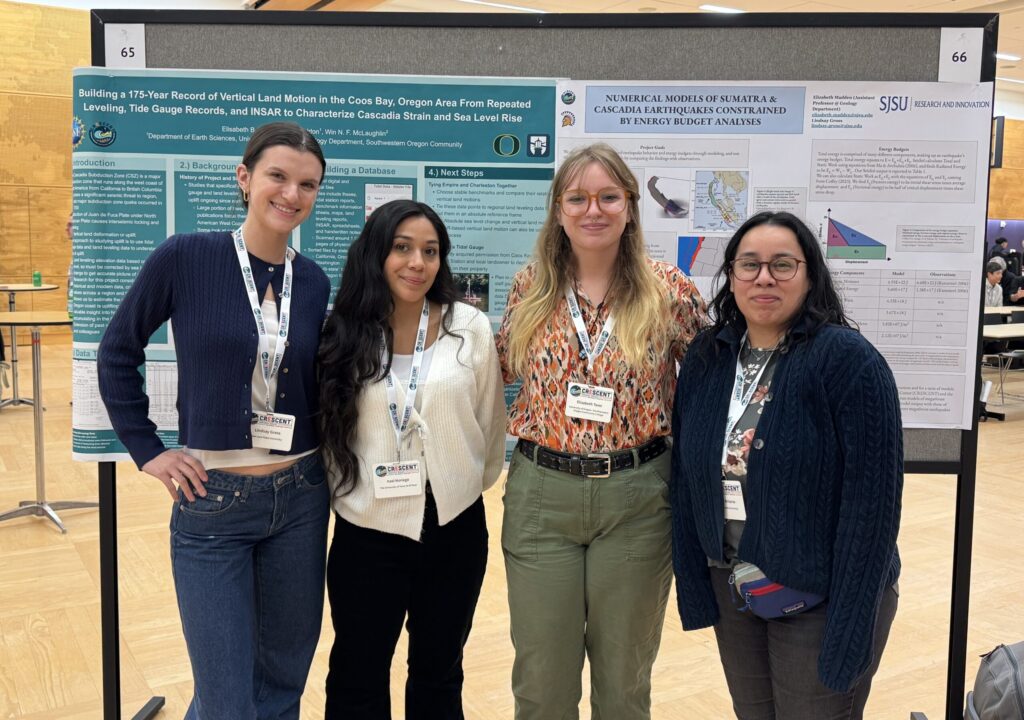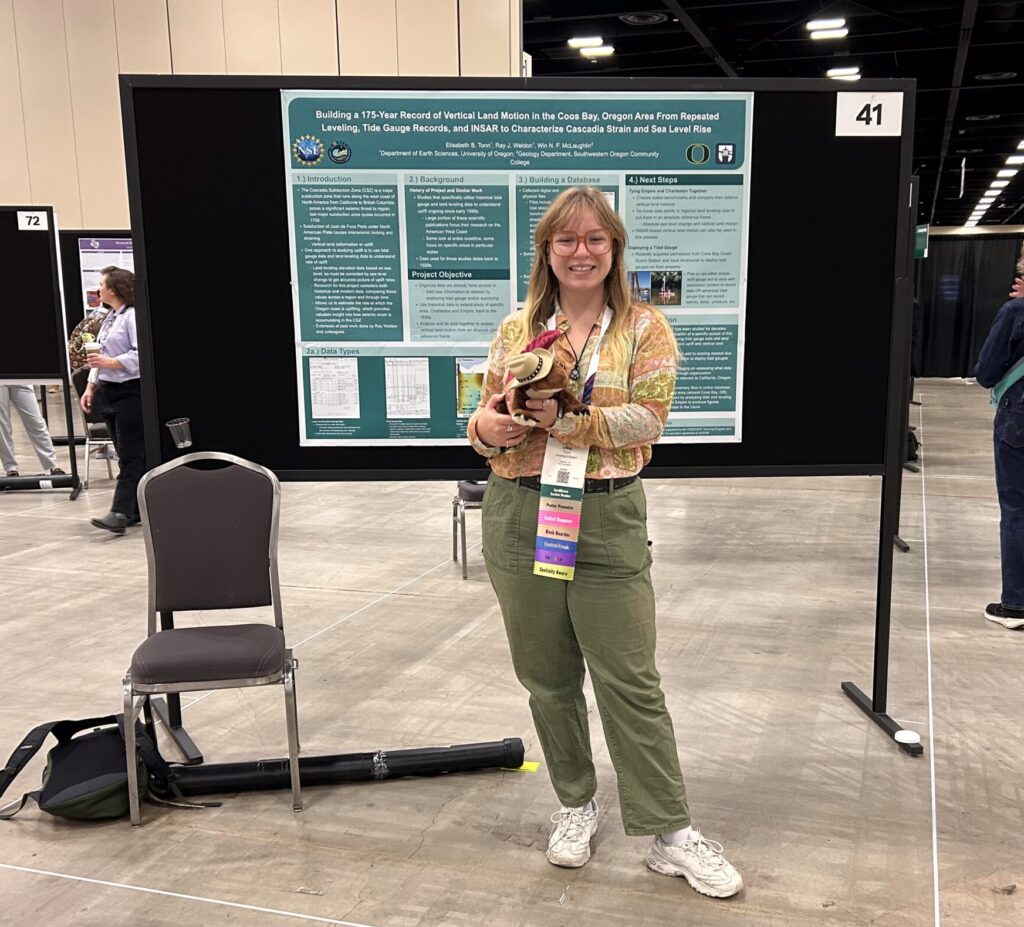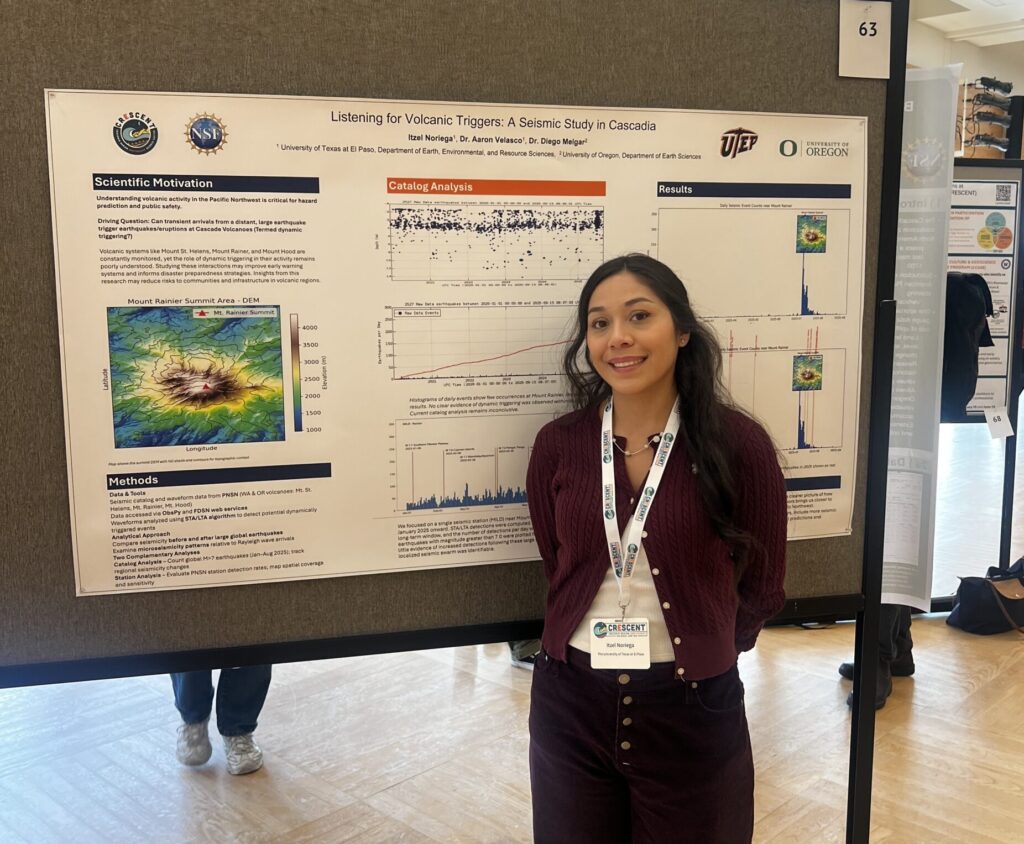
From Curiosity to Contribution: Students Thrive in CRESCENT’s Year-Long Geoscience Mentorship Program
November 3, 2025
Written by Noa Schwartz – CRESCENT Science Communication Intern; University of Oregon Student [2026]
Last fall, six undergraduates from across the country joined the first cohort of CRESCENT’s Geoscience Education and Inclusion (GEI) Twinning Program. Over the course of a year, they worked with mentors on fully funded research projects, developing practical skills and presenting their findings to fellow scientists. Dr. Shannon Fasola, GEI Program Manager, said the program offers a unique opportunity because “by funding the students year-round, they are able to focus on research without having to worry about supporting themselves financially.”
Itzel Noriega lives in El Paso, Texas, and just graduated as a geology major at the University of Texas at El Paso (UTEP). Her project focused on understanding how Cascadia’s subduction dynamics affect volcanic systems. Noriega is among a short list of scientists looking into this kind of research, the effects of which could have wide spreading implications.

“We’re the only ones viewing this right now,” Noriega said. “I learned that even if you have no idea what a project is [beforehand], do not let that keep you from working. Instead, I take it more as a challenge. I’ve surprised myself.”
Libby Tonn traveled an unlikely route to the program, moving from Minnesota to Oregon three years ago to study psychology at Southwestern Oregon Community College (SWOCC). After transferring to the University of Oregon (UO), she discovered geology. Tonn, mentored by Dr. Win McLaughlin (SWOCC) and Dr. Ray Weldon (UO), studied subduction strain and sea level rise in Coos Bay. The project was started by Dr. Weldon nearly 45 years earlier. Having a long-term project meant Tonn was working not only with the past, but with the future as well.
“My mentality was, what can I do right now that’s going to make this easier for whoever comes after me?” Tonn said.
Noriega’s team – Dr. Aaron Velasco at UTEP and Dr. Diego Melgar, CRESCENT Director at UO – gave Noriega insight into what a future in geology might look like. Noriega appreciated the help of two seasoned professionals helping her integrate into a new world.
“I think I got really lucky in my relationship [with my mentors],” Noriega said. “I felt a lot more comfortable because everyone knows everyone and everyone has a different specialty, so everyone brings something different to the table. They set me up to succeed.”
For Tonn, the best part of the program, and of geology research in general, is its relevancy. Science is nothing without application, and Tonn is assured in knowing that her efforts are working towards something greater.
“Since subduction zone earthquakes are such a huge hazard for the Oregon coast, it was really interesting to be able to do something somewhat tangible to help us better understand what’s happening in the subduction zone,” Tonn said. “It helped me feel connected to a larger cause, especially through CRESCENT, since all of us are studying subduction zone related topics, and it really helped me build a scientific community that I didn’t have access to previously.”
Connection with community is also personally important to Noriega, who spends time at local elementary schools with her mentor teaching children about Earth science. She wants to provide what she never had – a chance to spark passion for future geologists early on.
“When I talk to elementary school and middle school kids about STEM science, mostly about geology, it’s crazy how much their faces light up when they realize that’s something they can do,” Noriega said. “Now they have something different to think about instead of thinking ‘I thought I only had five options and I didn’t like any of them.’”
Tonn is proud to have presented her project at the Geological Society of America conference on October 19th and at the CRESCENT Annual Meeting on October 28-29. Her advice: practice self-compassion.


“Putting focus on not only developing your scientific research skills, but developing your communication skills and your ability to reach out and ask for help when you need it is really important,” Tonn said. “This is supposed to be a learning experience, and you can’t do something you’ve never done before perfectly.”
To Dr. Fasola, the future of geoscience looks bright. Long term learning opportunities like the Twinning Program are essential for training researchers and making room for growth.
“It was really rewarding watching the students grow over the past year and seeing how far they’ve come,” Fasola said. “The goal of the program was not about the new results they might have produced, but instead it was more about the experience along the way and learning something new. This was most of the students’ first experience working on a research project, so it was really rewarding to hear how this program impacted them and especially to read their Short Contributions [project reports] at the end of the program. I look forward to working with the next cohort of Twinning students!”
